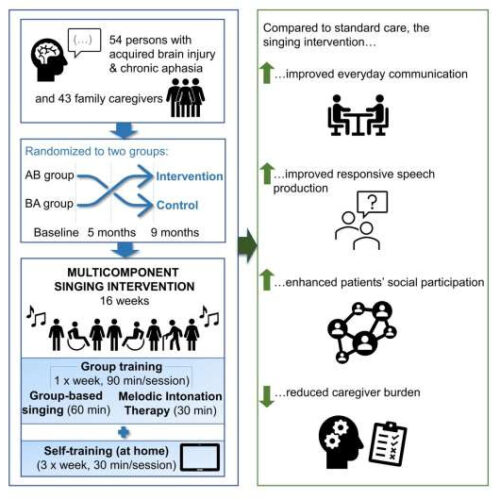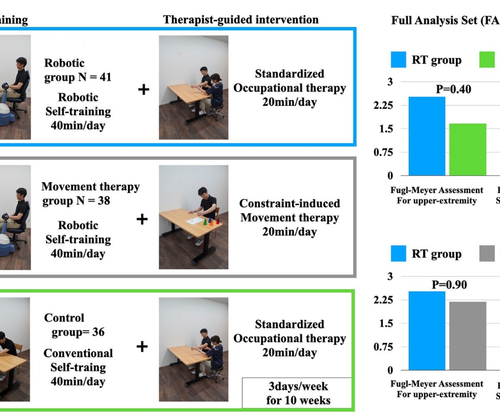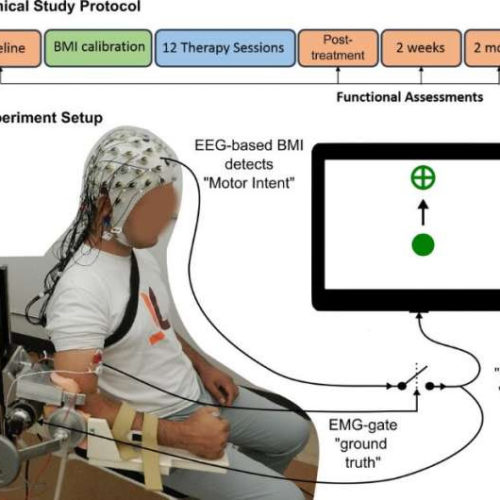by University of California, Los Angeles Stroke-projecting neurons are necessary for rehab-induced functional recovery. Credit: Nature Communications (2025). DOI: 10.1038/s41467-025-57860-0 A new study by UCLA Health has discovered what researchers say is the first drug to fully reproduce the effects of physical stroke rehabilitation in model mice. The findings, published in Nature Communications, tested two candidate drugs derived from their studies...
Tag: <span>stroke rehabilitation</span>
Advanced brain imaging technique could better tailor stroke rehabilitation
by Georgetown University Medical Center Credit: Pixabay/CC0 Public Domain A new Georgetown University Medical Center study exploring a new brain imaging technique is bringing stroke experts a step closer to better tailoring rehabilitation. The research was conducted in collaboration with MedStar Health and the National Institutes of Health. The work appears in Neurology. Neurologists often use MRI images of...
Arm robots are not the answer for stroke rehabilitation, research suggests
JULY 23, 2024 by Amsterdam University Medical Centers Credit: Unsplash/CC0 Public DomainCommercial arm robots are increasingly deployed in order to aid stroke patients in their recovery. Around 80% of patients have problems with their arm function. Robots are also seen as a solution to financial, and staffing, shortcomings in the health care sector. However, research...
First long-term study shows use of socially assistive robot improves stroke rehabilitation
JULY 24, 2024 by Ben-Gurion University of the Negev The experimental setup. A. Participant in the ROBOT group. The social robot Pepper gives instructions and feedback to the patient, which are presented both on the robot’s tablet screen and verbally. B. Participant in the COMPUTER group. The instructions and feedback are presented both on a...
Singing found to support stroke rehabilitation
by University of Helsinki Graphical abstract. Credit: Brain Communications (2022). DOI: 10.1093/braincomms/fcac337 Approximately 40% of stroke survivors experience aphasia, a difficulty with comprehending or producing spoken or written language caused by a cerebrovascular accident. In half of these cases the language impairment still persists one year post-stroke. Aphasia has wide-ranging effects on the ability to function and...
Robotic therapy: A new effective treatment for chronic stroke rehabilitation
OSAKA METROPOLITAN UNIVERSITY IMAGE: FIG 1. EACH GROUP’S THERAPY ROUTINE IS OUTLINED (LEFT) WITH FUGL-MEYER ASSESSMENTS (RIGHT). THE FUGL-MEYER ASSESSMENT IS A STROKE-SPECIFIC PERFORMANCE-BASED IMPAIRMENT INDEX THAT RATES PATIENTS’ ABILITY TO PERFORM TASKS ON A 3-POINT SCALE, 0 INDICATES TASKS CANNOT BE PERFORMED, 1 PARTIALLY PERFORMED, 2 PERFORMED. CREDIT: TAKASHI TAKEBAYASHI , OSAKA METROPOLITAN UNIVERSITY...
Low-power electrical stimulation could aid stroke rehabilitation
by DGIST (Daegu Gyeongbuk Institute of Science and Technology) Synaptic remapping by electrical stimulation after stroke. (a) The connection between pre-and postsynaptic neurons are rebuilt by stroke and electrical stimulation. After stroke newly made connections are strengthened by electrical stimulation. (b) Incoming EPSP from presynaptic neurons and additional potential provided by STES induces a postsynaptic...
FDA authorizes marketing of a new device for use in patients undergoing stroke rehabilitation
Reviewed by Emily Henderson, B.Sc. Apr 23 2021 Today, the U.S. Food and Drug Administration authorized marketing of a new device indicated for use in patients 18 and older undergoing stroke rehabilitation to facilitate muscle re-education and for maintaining or increasing range of motion. The Neurolutions IpsiHand Upper Extremity Rehabilitation System (IpsiHand System) is a...
Robotic exoskeleton training expands options for stroke rehabilitation
by Kessler Foundation Researchers used the Ekso GT to deliver high-dose gait training during inpatient rehabilitation for acute stroke. Credit: With permission from Ekso Bionics, Inc. A team of New Jersey researchers has demonstrated that high-dose therapy gait training using robotic exoskeletons may aid early rehabilitation for acute stroke. The article, “Robotic exoskeleton gait training...
Tapping the brain to boost stroke rehabilitation
by Jeannie Kever, University of Houston Testing showed most patients retained the benefits for at least two months after the therapy sessions ended, suggesting the potential for long-lasting gains. Credit: University of Houston Stroke survivors who had ceased to benefit from conventional rehabilitation gained clinically significant arm movement and control by using an external robotic device powered by...
- 1
- 2







